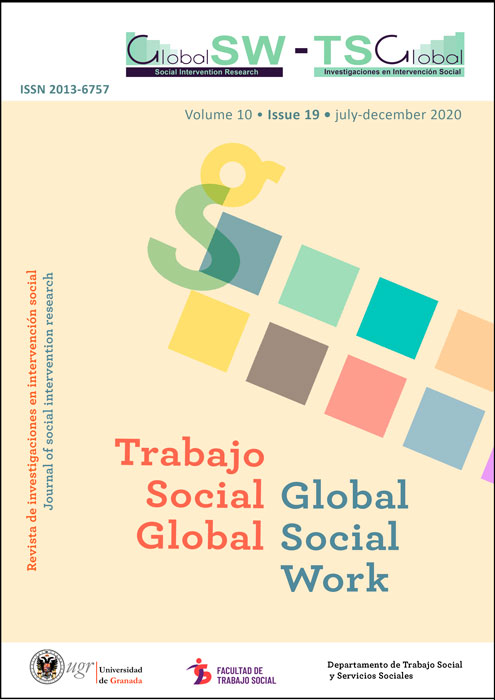Exploratory study on burnout syndrome in social work profession and its relation with work context variables
DOI:
https://doi.org/10.30827/tsg-gsw.v10i19.11375Keywords:
Burnout, Social Work, Work environmentAbstract
Social Work is a risk occupation regarding the development of burnout syndrome, due to the fact that social workers usually deal with people who are going through crisis situations. This syndrome causes serious consequences not only for the professional affected, but also for his/her personal and work environment. Therefore, it is relevant to analyse the magnitude of burnout syndrome and to identify the factors that may contribute both to its development and prevention. The present study is aimed, in the first place, to examine the prevalence of the burnout syndrome in a sample of 32 social workers from community social services in the island of Tenerife (Spain). In the second place, to analyse the relation between the three dimensions of the syndrome and some of the variables that characterize the work environment of these professionals. Results indicate that the sample show high levels of personal accomplishment and intermediate levels of emotional exhaustion, whereas they show few indicators of despersonalization. In addition, year career and feelings of work overload are related to more emotional exhaustion; whereas feelings that work is valued by colleagues seems to be a protector regarding accomplishment.
Downloads
References
Barrera, E., Malagón, J. L. y Sarasola, J. L. (2015). Trabajo social, su contexto profesional y el síndrome de burnout. Comunitania: International Journal of Social work and Social Science, 9, 51-71.
Bravo, J. (2003). Estrés laboral asistencial: el síndrome de burnout en trabajo social. En M. Martín (coord.). Trabajo Social en Gerontología (pp. 359-380). Sevilla: Síntesis.
Esteban, B. y Fernández, P. (2017). Las competencias para el desempeño profesional en Trabajo Social dentro de la formación: del burnout al engagement a través del manejo de las emociones. Trabajo Social Global – Global Social Work. 7(13), 142-168.
Facal, T. (2012). Prevalencia del síndrome de burnout en trabajadores sociales de los servicios sociales comunitarios. Portularia, XII(1), 59-69.
Fuente de la, I. N. y Sánchez, E. (2012). Trabajo social, síndrome de estar quemado por el trabajo y malestar psíquico: un estudio empírico en una muestra de trabajadores sociales de la Comunidad de Madrid. Portularia, XII(extra), 121-130.
Gil, P. R. (2005). El síndrome de quemarse por el trabajo (burnout). Una enfermedad laboral en la sociedad del bienestar. Madrid: Pirámide.
Gómez, R. (2013). Influencia de factores personales y organizacionales en la satisfacción laboral de los trabajadores sociales. Portularia, 13(2), 25-37.
Lázaro, S. (2004). El desgaste profesional (síndrome de burnout) en los trabajadores sociales. Portularia, 4, 499-506.
Leiter, M. P. y Maslach, C. (1988). The impact of interpersonal environment on burnout and organizational commitment. Journal of Organizational Behavior, 9, 297-308.
Maslach, C. y Jackson, S. E. (1981). The measurement of experienced burnout. Journal of occupational behaviour, 2, 99-113.
__________ (1986). Maslach Burnout Inventory. Manual. Palo alto, California: Consulting Psychologists Press.
Olivares, V. E. y Gil, P. R. (2009). Análisis de las principales fortalezas y debilidades del “Maslach Burnout Inventory” (MBI). Ciencia y Trabajo, 11(33), 160-167.
Puig, C. (2011). La supervisión en los equipos de Servicios Sociales: una oportunidad para la reflexión, el pensamiento y el cuidado de los profesionales. Cuadernos de Trabajo Social, 24, 123-133.
Roldán, E., Leyra, B. y Contreras, L. (2012). Segregación laboral y techo de cristal en Trabajo Social: análisis del caso español. Portularia, XII(2), 43-56.
Soto, A. y González, S. (2018). Satisfacción laboral y desgaste profesional en trabajadores de servicios sociales de atención a la infancia. Trabajo Social Global – Global Social Work, 8(14), 80-107.
Downloads
Published
How to Cite
Issue
Section
License
Authors publishing in this journal agree to the following terms:
- Authors retain their copyright. They guarantee to this journal the right to a first publication of the work submitted to initiate the editorial process.
- Authors know that their work is published under a Creative Commons License which allows others to share it, with a recognition of the work's authorship and its initial publication in this journal.
- Authors share with Global Social Work explotation rights of the work that has been published in this journal, authorizing the execution of a free reproduction, distribution and public communication. Authors know that their work will be stored on servers and reproduced in digital format for inclusion in institutional repositories and databases that will facilitates free access to the full text of the work.
- Authors may distribute the version of the work published in this journal (for example, to an institutional repository or publish it in a book), with the explicit acknowledgment of its initial publication in this journal.
Copyright on the texts published in Trabajo Social Global -Global Social Work, as well as editorial policy of the journal refering to self-file and deposit in institutional or thematic repositories, are identified in the database





















